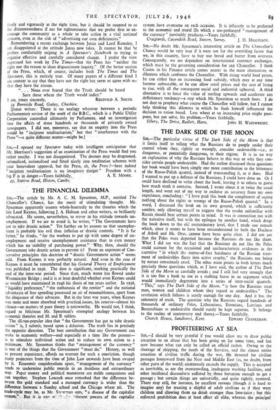THE FINANCIAL DILEMMA
Sut,—The article by Mr. A. C. M. Spearman, MY., entitled The Cluincellor's Chance, has the merit of stimulating thought: Mr. Spearman apparently assents -whole-heartedly to the theories which the late Lord Keynes, following J. A. Hobson and other writers, so brilliantly advocated. He seems, nevertheless, to waver in his attitude towards•un- employment. If we are to avoid it, he writes; " The Government have got to take drastic action." Yet further on he assures us that unemploy- ment is probably less evil than inflation or drastic controls. "It is far better," he thinks, " for the workers to put up with some degree of un- employment and receive unemployment assistance than to earn money which has no 'stability of purchasing power." " Why, then, should -the Government take drastic action to prevent it? From an exponent of Con- servative principles this doctrine of "drastic Government action" seems odd. From Keynes it was perfectly natural. And even in the case of Keynes it must be remembered that his General Theory of Employment was published in-1936.. The date is significant, marking practically the end of the inter-war period. Since then, much water has flowed under Westminster Bridge ; and it is at least doubtful whether even Keynes could or would have maintained in 1946 his thesis of ten years earlier. In 1936, " liquidity preference," "the euthanasia of the render " and the national advantages of free spending possessed an air of reasonableness, apart from the eloquence of their advocate. But in the later war years, when Keynes was more and more absorbed with practical, issues, his reserve—almost his silence—on matters of pure theory is noteworthy. He would not, I think, regard as felicitous Mr. Spearman's attempted analogy between his economic theories and M. and B. tablets. The all-too-popular idea that " the Government has got to take drastic action " is, I submit, based upon a delusion. The truth lies in precisely the opposite direction. The best contribntion that any Government can make to economic welfare—and especially at a time like the present— is to stimulate individual action and to reduce its own action to a minimum. Mr. Spear-man thinks that " management of the currency " is one of the things that the Government " must do." History, as well as present experience, affords no warrant for such a conviction, though many projectors from the time of John Law onwards have been swayed by it. Economic considerations apart, "management of the. currency" tends to undermine public morale in an insidious and extraordinary way. Paper money and political manoeuvre are stable companions and sun together. Stephen Leacock once remarked that the difference be- tween the gold standard and a managed currency is wider than the difference betweed a Sunday school and the Chicago wheat pit. The trade-cycle may be, as Mr. S,v-scrnan says, " a disease of the capitalist
system." But it is one w' ° ;aherent powers. of the capitalist system have overcome on each occasion. It is infinitely to be preferred to the economic- and moral tills which a too-prolonged " management of the currency " inevitably produces.—Yours faithfully.
Craiglands, Cavendish Road, Sutton, Surrey. J. H. HIGGINsON.






























 Previous page
Previous page